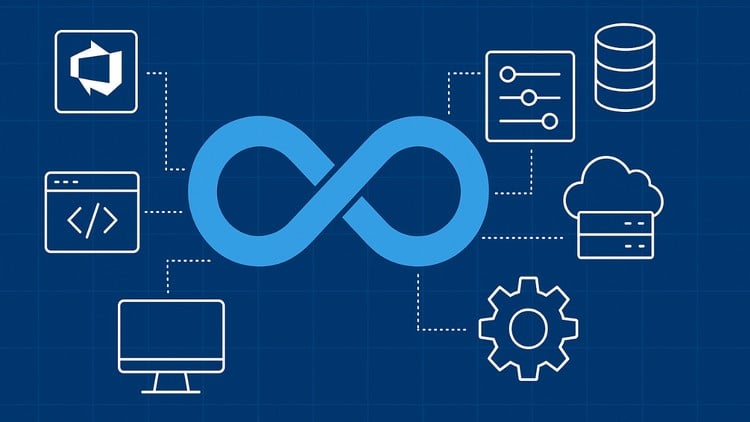
Master DevOps automation with Azure Pipelines, Boards, Repos, YAML. Build, test, deploy, manage modern CI/CD workflows.
⏱️ Length: 28.0 total hours
👥 875 students
Add-On Information:
Note➛ Make sure your 𝐔𝐝𝐞𝐦𝐲 cart has only this course you're going to enroll it now, Remove all other courses from the 𝐔𝐝𝐞𝐦𝐲 cart before Enrolling!
-
Course Overview
- Transformative Software Delivery: Shift from traditional methods to a fully automated, collaborative, and streamlined software delivery pipeline using Azure DevOps.
- Real-World Application Focus: Gain practical experience applying Azure DevOps services to solve common development and operational challenges, orchestrating the entire software lifecycle.
- Strategic Team Integration: Understand how Azure DevOps bridges the gap between development and operations, fostering true collaboration through shared tooling and processes.
- Advanced DevOps Concepts: Explore critical topics such as pipeline security, cost optimization within Azure, and foundational principles of Infrastructure as Code (IaC) integration.
- Evolution of CI/CD: Grasp the modern evolution of CI/CD practices and Azure DevOps’ role as a comprehensive, enterprise-grade platform for modern software engineering teams.
- Beyond Pipelines: Delve into the collaborative aspects of Azure DevOps (e.g., Boards, Repos) to enhance transparency, communication, and a robust DevOps culture.
- Scalable Azure CI/CD Solutions: Learn architectural considerations for designing CI/CD solutions that scale with organizational growth and evolving project needs.
-
Requirements / Prerequisites
- Basic Programming & Git: Familiarity with programming concepts and foundational Git version control knowledge.
- Cloud Fundamentals (Optional but Recommended): A basic understanding of cloud computing, particularly Azure, will be beneficial.
- Azure Subscription Access: Required for hands-on labs and practical exercises (free tier often sufficient).
- CLI Comfort: Basic comfort with command-line interfaces for scripting and automation tasks.
- Active Engagement: A proactive willingness to participate in labs, troubleshoot, and explore new tools.
- SDLC Awareness: Basic understanding of the software development lifecycle stages.
-
Skills Covered / Tools Used
- Advanced Git & Azure Repos: Master branching strategies, pull request policies, and effective code review within Azure Repos.
- Declarative YAML Pipelines: Author complex build/release workflows using YAML, focusing on templates, reusability, and modularity.
- Comprehensive Artifact Management: Publish and consume NuGet, npm, and Docker artifacts efficiently using Azure Artifacts.
- Advanced Environment Control: Configure release gates, manual approvals, and pre/post-deployment conditions for secure environments.
- Secure Secrets with Key Vault: Integrate Azure Key Vault into pipelines for secure management of sensitive credentials.
- CI/CD Monitoring Integration: Connect pipeline outcomes with Azure Monitor for real-time insights into deployment health.
- Automated Container Workflows: Build and push Docker images to Azure Container Registry directly from pipelines.
- Test Automation Orchestration: Integrate unit, integration, and UI tests into pipelines for continuous quality assurance.
- IaC with Azure CLI/ARM: Apply Infrastructure as Code principles to provision Azure resources directly from pipelines.
- Enterprise Collaboration Features: Leverage shared resources, security groups, and permissions for large-scale projects.
- Pipeline Optimization: Implement strategies to reduce build times, manage agents, and optimize resource consumption.
- CI/CD Security Best Practices: Embed least-privilege principles, static code analysis, and vulnerability scanning in pipelines.
-
Benefits / Outcomes
- Faster Time-to-Market: Significantly accelerate feature delivery and updates through highly automated and efficient workflows.
- Improved Software Quality: Enhance reliability by embedding robust testing and continuous feedback loops early in development.
- Stronger Team Collaboration: Foster a culture of shared responsibility and transparency across development and operations.
- Reduced Operational Burden: Minimize manual errors and free up engineering time by automating repetitive tasks.
- Enhanced Career Prospects: Acquire highly sought-after Azure DevOps and CI/CD automation skills, boosting professional value.
- Scalable & Resilient Deployments: Design systems with automated rollout/rollback for increased load and graceful recovery.
- Cost-Efficient Cloud Usage: Optimize Azure resource utilization through automated provisioning and de-provisioning.
- Robust Auditability & Compliance: Establish clear audit trails for all changes, supporting governance and regulatory needs.
- Empowered Innovation: Enable faster iteration and confident experimentation with new features due to reliable automation.
- Enterprise DevOps Mastery: Gain expertise to implement and manage sophisticated, large-scale DevOps solutions.
-
PROS
- Hands-on & Practical: Strong emphasis on real-world scenarios and practical labs for actionable learning.
- Comprehensive Coverage: Covers Azure DevOps services from foundational concepts to advanced implementation techniques.
- Expert-Led Insights: Benefits from industry experts sharing practical experience in enterprise-scale DevOps.
- Flexible Learning: Designed to accommodate diverse learning paces for effective mastery.
- Best Practices Focus: Instills current industry best practices for secure and efficient CI/CD pipeline development.
-
CONS
- Significant Time Investment: Requires substantial time for study, practice, and hands-on labs to achieve true mastery.
Learning Tracks: English,IT & Software,Other IT & Software
Found It Free? Share It Fast!